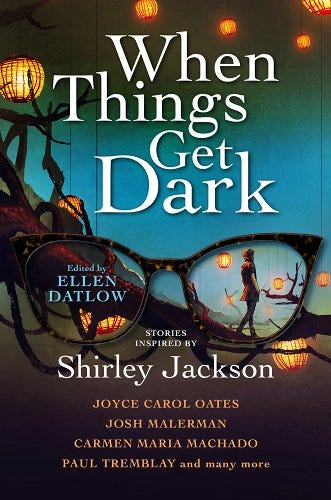Halloween Edition: The Banality of Evil
A spooky homage to Shirley Jackson and a review of a French red
I first read the short story, “The Lottery,”* by Shirley Jackson during my senior year of high school. I encountered it again as a junior in college. I re-read it this weekend and it is no less frightening (perhaps even more given the mob mentality of Jan 6). When the story was first published on June 26, 1948, in The New Yorker, the magazine received more letters, calls, and cancellations regarding “The Lottery” than anything they published before or since. Shirley Jackson had a gift for psychological terror as opposed to simply horror and it was totally unexpected in 1948.
In researching Jackson, I discovered that “The Lottery” is often interpreted to reflect anti-Semitism.** It has been referenced as an example of what Hannah Arendt called “the banality of evil;” evil, as something everyday and accepted, without acknowledging the true horror. (I’ll let you read more from the brilliant Hannah Arendt on your own.) The When Things Get Dark collection deftly handles the everyday and accepted evils.
Book: When Things Get Dark: Stories Inspired by Shirley Jackson
Edited by Ellen Datlow
Titan Books, 2021
When Things Get Dark is a short story collection curated by the discerning Ellen Datlow. I picked up When Things Get Dark a couple of weeks ago in Chicago from the Halloween display at Barbara’s Bookstore. Usually, I can tear through a book in a matter of days. Not so much with this one. Between the fact that it is a physical book (I couldn’t enlarge 👓 the font size) and that after an average of two stories each night I was just this side of frightened, it took me two weeks to finish it.
Most of these stories are haunting, but several touch the psychological terror and unknowing mastered by Shirley Jackson. Not surprisingly, the story that captures this perfectly is “Take Me, I Am Free” by Joyce Carol Oates. In only four pages, Oates causes consternation, followed by disbelief, and leaves you with the fear of what might happen. Other stories that kept me up at night include “Pear of Anguish” by Gemma Files and “In the Deep Woods; The Light is Different There” by Seanan McGuire. “The Party” by Paul Tremblay is reminiscent of some of Neil Gaiman’s darker short stories. There is a jolt in not quite knowing how something ends, or in not understanding why humans often act so inhumane to others. You won’t find the answers in these stories; you are left with only the darker parts of your imagination.
My review:
*Read “The Lottery” in The New Yorker for free. (Signup required.)
**Shirley Jackson married Stanley Hyman, a Jewish literary critic and professor. She experienced first-hand the anti-Semitism in the 1940s, and many see this experience as inspiring “The Lottery,” and thus the adjacent writing of Hannah Arendt.
Paired with Domaine Terra Noe
IGP Ardeche, France, 2020
70% Syrah, 30% Grenache
14.5% AbV
~$22
Biodynamic (French: AB certified)
Given the option, I will always choose a French wine over anything else. I am a Francophile at heart. So when I went looking for a red to review for Halloween (which just feels like a “red wine” kind of holiday), this one seemed like a perfect choice. The grapes, grown in the Mediterranean climate near the Ardeche River in the Rhône Valley are farmed biodynamically. The high alcohol content, 14.5% AbV, makes me think that this is not a “natural” wine.***
On the nose, the scent of figs wafted up immediately, followed by some chocolate and of course, dark berries. When I tasted it, I was surprised. It was lighter and brighter than I anticipated. With the blend of Syrah and Grenache, as well as the high alcohol content, I expected a bigger, darker wine. There are soft tannins throughout, not bitter. The finish had some spices and small notes of chocolate. I’m sensitive to high alcohol contents and I tasted it a little on the finish and in my nose. It dissipated rapidly.
My rating:
***Natural wine is all the rage right now, and I prefer it. It’s sometimes called “raw” wine and it’s farmed using organically or biodynamic methods. What separates natural wine from those simply farmed organically is that there are no additives added in the winemaking process. This often results in a lower alcohol content (~12-13%). This article on Vox gives a great explanation.
I hope you enjoyed today’s Halloween edition and I’ll leave you with my dachshund, Ringo, in his oversized Yellow Submarine costume. Happy Halloween(ie)!
Remember, sharing is caring and subscribing is free!






